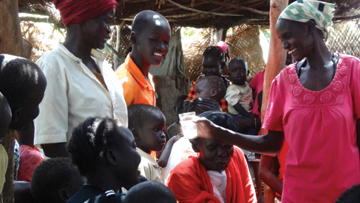One day while walking to the market, Agau, a member of the Parot Church Health Group in South Sudan, came upon a woman crying outside her hut. Agau stopped and asked her what was wrong.
“My children are dying!” she cried.
Agau hurried into the hut and found four young children burning with fever.
Agau assisted the mother in removing their clothes and cooling them with water. She asked the mother for salt, sugar, and water and showed her how to make rehydration drinks and administer them. Then she prayed for the children.
“You know so much. Are you a doctor?” asked the mother.
Agau explained that God had allowed her to learn these things. Then she told the woman about the Great Healer. He had given her knowledge so that she could help others as a follower of Christ.
Agau went back the next day and found the children much improved. Now she continues to visit with this family, sharing her life and faith with ...

